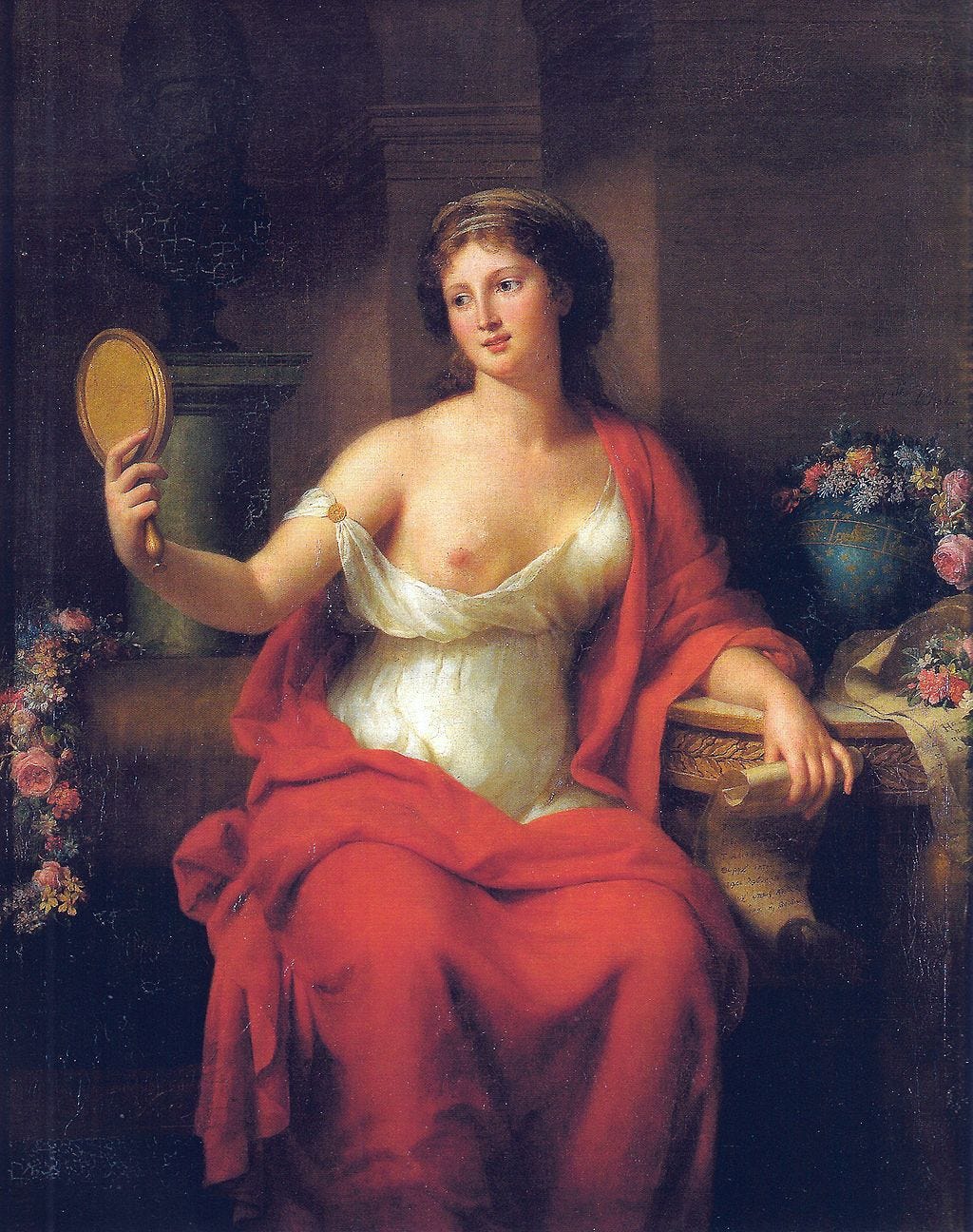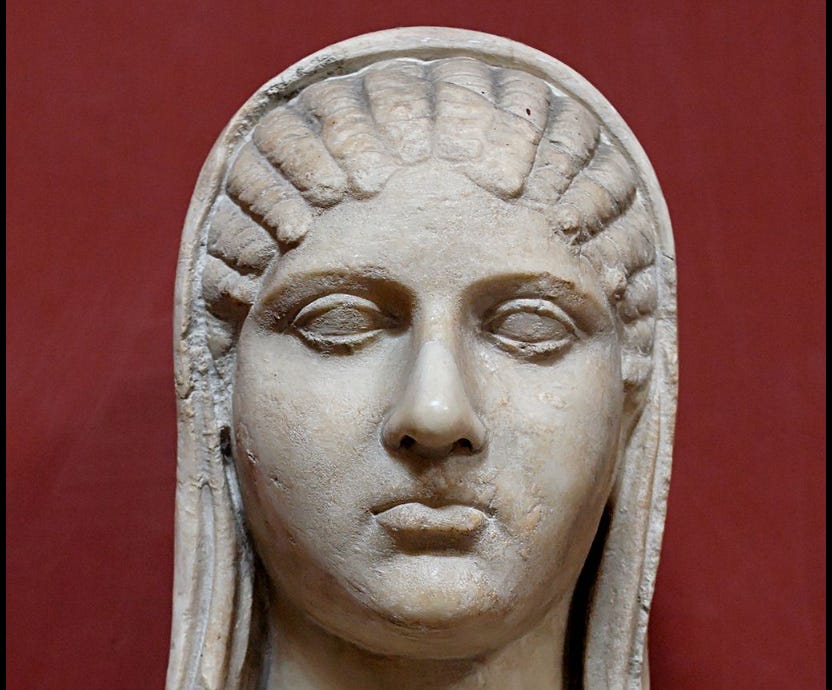
Dear Classical Wisdom Reader,
Discord! Dispute! Debate! It is disagreement on which we thrive.
After all, without controversy, life would be boring...
Without contrast, there would not be checks and balances. Bad ideas and movements would not be countered and good ones thoroughly tested...
Without challenge, there would be no opportunities to grow, chances to improve or progress. Indeed, it is when we are proved wrong that we learn the most...
So last week, when Professor of Classics at Oxford University, Armand D’Angour, contested in good nature a point in our article on Aspasia, I was thrilled. Here was a fortuitous occasion to augment our knowledge of the ancient world.
Indeed, it is remarkable that topics as old as those found in these humble pages are still being tested, revised and amended... a fact which I more than welcome. Ancient wisdom is a part of an ongoing conversation, a process in which we can discuss the ideas and concepts that are essential to understanding ourselves and the history from which we have been produced.
And to that end, it is critical to know what that history is in the first place... and to embark on new investigations of old events to see if we can get to the truth of the matter, past established biases and shaped narratives to find the hidden stories.
We regularly discuss the relationship between myth and history, and how often what appears as one is really the other. Viewing our modern events through either distorted side of the political spectrum has been an incredible insight into just how different one event can be depicted, depending on who is telling the story. It demonstrates why it is so difficult to discover what truly happened. We need to be investigators of the highest standards to see past propaganda and political defamation...both then and now.
So what to do about Aspasia, arguably Athens’ most important woman? What is the truth of the woman who, for so long by so many, was considered a high level prostitute? I must admit, I had counted myself among them... so I was genuinely grateful for the chance to be corrected.
Happily, Armand responded to my request for a follow up and with remarkable punctuality has already supplied a short piece for your consideration. Read below for Armand’s defense of the great Aspasia and see if we can separate the evidence from comic slander...
All the best,
Anya Leonard
Founder and Director
Classical Wisdom
As we mentioned above, discovering the truth to our shared history can help us learn as individuals AND as a society. Now, more than ever, we need to hear the lessons of the past... but this can only happen if we are first committed to preserving them, discussing them and keeping classical wisdom alive in our here and now.
Be a part of this mission to ensure that the wisdom of the ancients can help us today... as well as for future generations. Join our growing community to support this project:
Rehabilitating Aspasia: separating the evidence from comic slander.
By
Ancient Athens was a patriarchal and in many ways a misogynistic society. Girls received no formal education and women were largely excluded from public life. To ensure the legitimacy of the paternal line in citizen families, girls were generally subject to betrothal (enguē) before puberty and celebrated marriage (gamos) shortly after pubescence, perhaps as young as 13. They were then expected to manage household matters and remain well outside of male society and politics.
It’s not surprising that if a woman of exceptional character and intellect were to emerge on the Athenian political scene, she would be viewed with suspicion and anger. Such was the case with Aspasia of Miletus. Her birth in a non-Athenian city – Miletus was a Greek settlement on the coast of Asia Minor – meant that when she came to Athens unmarried around 450 BC (perhaps aged 20), she could be thought of as an ‘Asian’ immigrant, of which a number were prostitutes (pornai) or courtesans (hetairai). But in her case, she was related via her father Axiochus to the most elite of Athenian families, the Alcmaeonids, of which Pericles, Athens’ leading citizen, was a member, as was Aspasia’s brother-in-law (her sister’s husband) Alcibiades the Elder.
Aspasia was also unusually well educated (Miletus was famous for its philosophers), and a contemporary biographer tells about the salons she conducted in Athens about love and marriage (perhaps in the home of her aristocratic relative Alcibiades), which were attended by elite Athenians including Socrates. She soon captivated Pericles himself, and by 445 they were effectively and probably formally (see below) man and wife. His love and respect for her were widely known and observed, and she was suspected of and attacked for being a strong influence on his subsequent political decisions – notably his leading Athens to war against the island of Samos in 440 BC, and then against the Spartans and their Peloponnesian allies in 431 BC.
Scholars have regularly made the error of supposing that Pericles could not have married Aspasia because she was a non-Athenian. They base this supposition on the fact that 451 BC Pericles proposed and carried a law aimed at restricting Athenians from marrying non-Athenians. The law stipulated only that the sons of such marriages would not have the status of Athenian citizens. It was a measure aimed at disincentivizing marriages to non-Athenian women – but it didn’t forbid or prevent them from happening.
Perhaps a lack of betrothal (enguē) implied only half a marriage, since betrothal plus gamos aimed to ensure that young women were virgins at marriage. When Pericles died, however, we are told that Aspasia ‘remarried’ Lysicles (epegēmato). That surely indicates an earlier marriage gamos with Pericles, probably around 445 when she was around 25.
Keep the Classics Alive! Support our mission of bringing ancient wisdom to modern lives by joining our community:
When Aspasia bore Pericles a child, Pericles Junior, in the 440s, Pericles successfully appealed to the Assembly, Athens’ sovereign legislative body, to allow their child to be granted citizenship in contravention of the law he had proposed. This appeal could not have been entertained, let alone formally brought to the Assembly, had their boy simply been, as anti-Periclean comedians cruelly sought to portray him, the "bastard child of a foreign prostitute".
Pericles Junior, who went on to be a general (he was sadly executed after the failures at Arginusae in 406), can only have been acknowledged as the son of Pericles and his gametē – legally wedded wife.
The serious biographers of Socrates, Plato and Xenophon, speak of Aspasia only in respectful terms, depicting her as a clever woman and a teacher of eloquence. It is only the comic poets, the ancient equivalents of today’s tabloid newspapers and caricaturist comic revues, who revile and insult her as a ‘prostitute’, ‘concubine’, ‘brothel-keeper’, and ‘mother of a bastard child’.
Amazingly, generations of (male) scholars have – with honourable exceptions – dismissed the biographers as joking, and taken the latter as serious evidence for Aspasia’s status. They have managed to persuade themselves of comic fantasies: that Aspasia ran a brothel, while remaining Pericles’ beloved partner for 15 years until he died; that a squabble about two of her prostitutes led to Pericles’ making war on Megara (the scenario painted by Aristophanes in Acharnians); and even that the one-eyed comic poet Hermippus prosecuted Aspasia for impiety in court – when fifth-century Athenian law did not accord women or non-Athenians sufficient status to allow them to be the subject of a lawsuit.
With similar insensitivity (and perhaps even unconscious misogyny), those who could not see that comedians were simply parroting anti-Periclean sentiments by defaming Aspasia settled on a convenient middle-ground. Perhaps she was not a common prostitute and brothel-madam as the comedians (and only they) depicted her, but at least she was a hetaira – one of those “highly educated, highly sophisticated courtesans who would have been skilled at dance, song, conversation, and would have likely been present in the inner circles of powerful, affluent men…probably the closest thing to liberated women during this time. They were allowed to pursue education, engage in civic debate, they even paid taxes!”
Of the dozens of ancient sources that speak about Aspasia, for good or ill, how many call her a hetaira? Not one. So nor should we. Aspasia was either a common prostitute and brothel madam (as per the comedians), or she was a brilliant teacher, eloquent thinker, and Pericles’ beloved, captivating, and thoroughly maligned wife (as per the biographers). Take your pick.
Más info en https://ift.tt/xCJGsQR / Tfno. & WA 607725547 Centro MENADEL (Frasco Martín) Psicología Clínica y Tradicional en Mijas. #Menadel #Psicología #Clínica #Tradicional #MijasPueblo
*No suscribimos necesariamente las opiniones o artículos aquí compartidos. No todo es lo que parece.


No hay comentarios:
Publicar un comentario